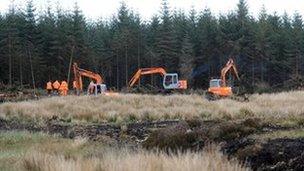Disappeared issue 'a festering wound' says McGuinness
- Published

Extensive searches have been carried out for the remains of the Disappeared
The fact that some families still do not know where their murdered relatives were secretly buried by the IRA is a "wound that must not be left to fester", Martin McGuinness has said.
The Northern Ireland deputy first minister was speaking after the plight of the families of the Disappeared was highlighted in a BBC/RTÉ documentary.
He said he would "make every effort both publicly and privately to see this grave injustice brought to an end".
He appealed for fresh information.
The documentary, shown on BBC Northern Ireland and RTÉ on Monday, featured interviews with relatives of those who had been murdered.
'Humanitarian issue'
After the programme was broadcast, the Independent Commission for the Location of Victims' Remains, external said it was appealing for new information "in a spirit of common human decency".
This was echoed by the Sinn Féin MP, who described it as a "humanitarian issue".
"I understand that these killings happened decades ago and those involved may be dead, may not have been active in republicanism since that time or indeed may well be hostile to Sinn Féin and the peace process," said Mr McGuinness.
"But despite these difficulties, I do believe that we must continue efforts to see a positive resolution for the families."
He added: "Those who seek to make political capital out of these terrible and tragic events will only dissuade them."
Mr McGuinness was speaking after the group set up to obtain information on where the bodies are buried issued a fresh appeal.
The Independent Commission for the Location of Victims' Remain said the documentary had demonstrated "once again the dreadful burden that the families of the Disappeared have had to bear for so long".
"Theirs is a tale of tragedy and denial - the tragedy of the loss of a loved one and the denial of their right to bury their loved ones decently and to have a place to grieve," it said.
'Guaranteed confidence'
Commissioners Frank Murray and Sir Ken Bloomfield said their work did not involve seeking prosecutions but was only aimed at addressing "the hurt and disappointment that the families of the Disappeared have endured for decades".
They said information could be given to the commission in "guaranteed confidence".
The commission was established in 1999 by a treaty between the British and Irish governments.
It lists 16 people as "disappeared". Despite extensive searches, the remains of seven of them have not been found.
Meanwhile, Traditional Unionist Voice leader Jim Allister has criticised a refusal by the assembly's Speaker to allow a "matter of the day" debate on the documentary's findings as it did not meet the criteria.
Mr Allister said: "It seems that once again anything that could possibly embarrass Sinn Féin and upset the cosy cabal cannot be raised on the 'Hill'.
"It can be debated on the Nolan Show but not in Stormont."
The issue was raised in the Irish parliament by Fianna Fáil leader Micheál Martin, who described the programme as "harrowing".
Sinn Féin President Gerry Adams, who in the documentary repeatedly rejected allegations he was involved in the disappearance of mother-of-10 Jean McConville in 1972, said the programme should be a "huge motivation for anyone who has any information whatsoever to bring it forward".
In response to the North Louth TD, Irish Prime Minister Enda Kenny said he hoped the programme "stimulates active minds to make their information available".
"The fact of the matter is that somebody ordered that Jean McConville be murdered, somebody instructed that people take her away, somebody instructed the late Dolours Price to drive that vehicle across the border and somebody instructed that what happened took place," he said.
"It may well be that those people are still around and they know what happened; your own appeal from this house may well have some effect and I hope it has.
"For others who disappeared in a similar fashion, if they are laid to rest in tragic circumstances in County Meath or County Monaghan, there are people who know what happened to them as well."